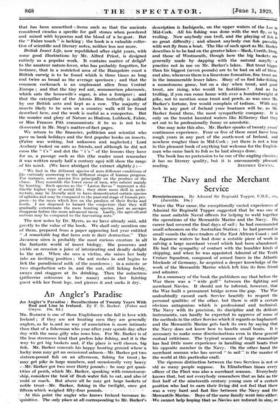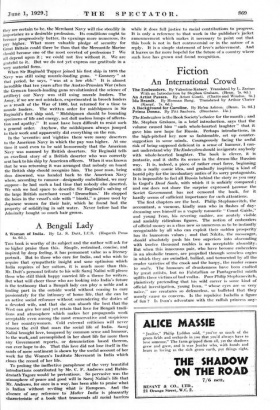The Navy and the Merchant
• Service
Reminiscences. By Admiral' Sir Reginald Tupper, C.B.E., etc.
• (Jarroldi. 10s.)
WHEN the War came, the exceptionally varied experiences of 'Admiral Sir Reginald Tupper suggested that he was one of the most suitable Natal officers for helping to weld together the operations of the Mercantile Marine and the Navy. His career had covered the final days of sail ; he had commanded small schooners on the Australian Station ; he had pursued in small vessels the slave-traders of the East African Coast ; and in Japanese waters he had done a notable piece of work in salving a large merchant vessel which had been abandoned. He had the sympathy of contact with the humbler kinds of shipping, and when he was appointed Admiral of the Tenth Cruiser Squadron, composed of armed liners in the Atlantic blockade of Germany, he acquired a deeper knowledge of the work of the Mercantile Marine which left hurl its firm friend and admirer.
In a summary of the book the publishers say that before the War there was a "wide gulf-" between the fighting and merchant Navies. It should not be inferred, however, that the War built a permanent bridge across the gap. The Was undoubtedly caused each Service heartily to respect the personal qualities of the other, but there is still a certain obvious antagonism which is professional and technical. The Navy with its precision, its discipline and its delicate instruments, can hardly be expected to approve of some of the methods in the other Service-which it regards as haphazard; and the Mercantile Marine gets back its own by saying that the Navy does not know how to handle small boats. It is .necessary to make some discriminations even in these general -mutual criticisms. The typical seaman of large steamships has had little more experience in handling small boats than his opposite member in the Navy. On the other hand the merchant seaman who has served "in sail "is the master of
The world at this particular craft. . - .
The rigorous distinction between the two Services is not so old as many people suppose. In Elizabethan times every officer of the Fleet was also a merchant seaman. Everybody -knows that, but not everybody remembers that as late as the first half of the nineteenth century -young . men of a certain position who had to earn their living did not feel that there -was a very hard and fast line between the Navy and the
• Mercantile Marine. Boys of the same family went into either. We cannot help hoping that as Navies are reduced-in size, as they are certain to be, the Merchant Navy will rise steadily in importance as a-desirable profession. Its conditions ought to become progressively better, its openings more numerous, its pay -higher. What more valuable pledge of security for Great Britain could there be than that the Mercantile Marine should become one of the most coveted of professions ? We sill depend upon it ; we could not live without it. We are grateful to it. But we do not yet -express our gratitude in a very material form.
When Sir Reginald Tupper joined his first ship in 1876 the Navy was still using muzzle-loading guns. " Gunnery" at that period, -he says, "was at a low ebb." It is almost incredible that ten years after the Austro-Prussian War (when the German breech-loading guns revolutionized the science of artillery) our Navy was still using muzzle loaders. The Army, if we are not mistaken, experimented in breech loaders as a result of the War of 1866, but returned for a time to muzzle loaders. The written order for midshipmen in Sir Reginald's first ship said, "Midshipmen should be bounding specimens of life and energy, not dull useless-lumps of affecta- tion and apathy," It must have been difficult to resist such a general order. Anyhow, the midshipmen always jumped to their work and apparently did everything on the run.
In the 'seventies and 'eighties there were many deserters to the American Navy in which the pay was higher. At one time it used even to be said humorously that the American Navy was manned by British deserters. Sir Reginald tells an excellent story of a British deserter who was correctly sent back to his ship by American officers. When it was known that he was returning it was arranged that nobody on board the British ship should recognize him. The poor man, being thus disowned, was handed back to the American Navy where, according to rumour—designedly embellished, we may suppose—he had such a bad time that nobody else deserted. We wish we had space to describe Sir Reginald's salving of the large British merchant vessel Drumeltan.' He stopped the holes in the vessel's side with " binski," a grease used by Japanese women for their hair, which he found had the property of solidifying in salt water. Never before had the Admiralty bought so much hair grease.











































 Previous page
Previous page